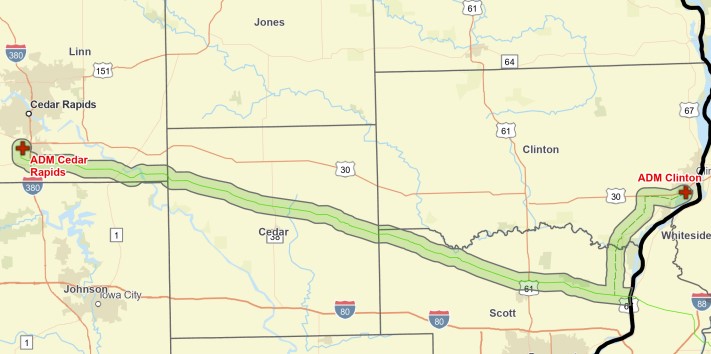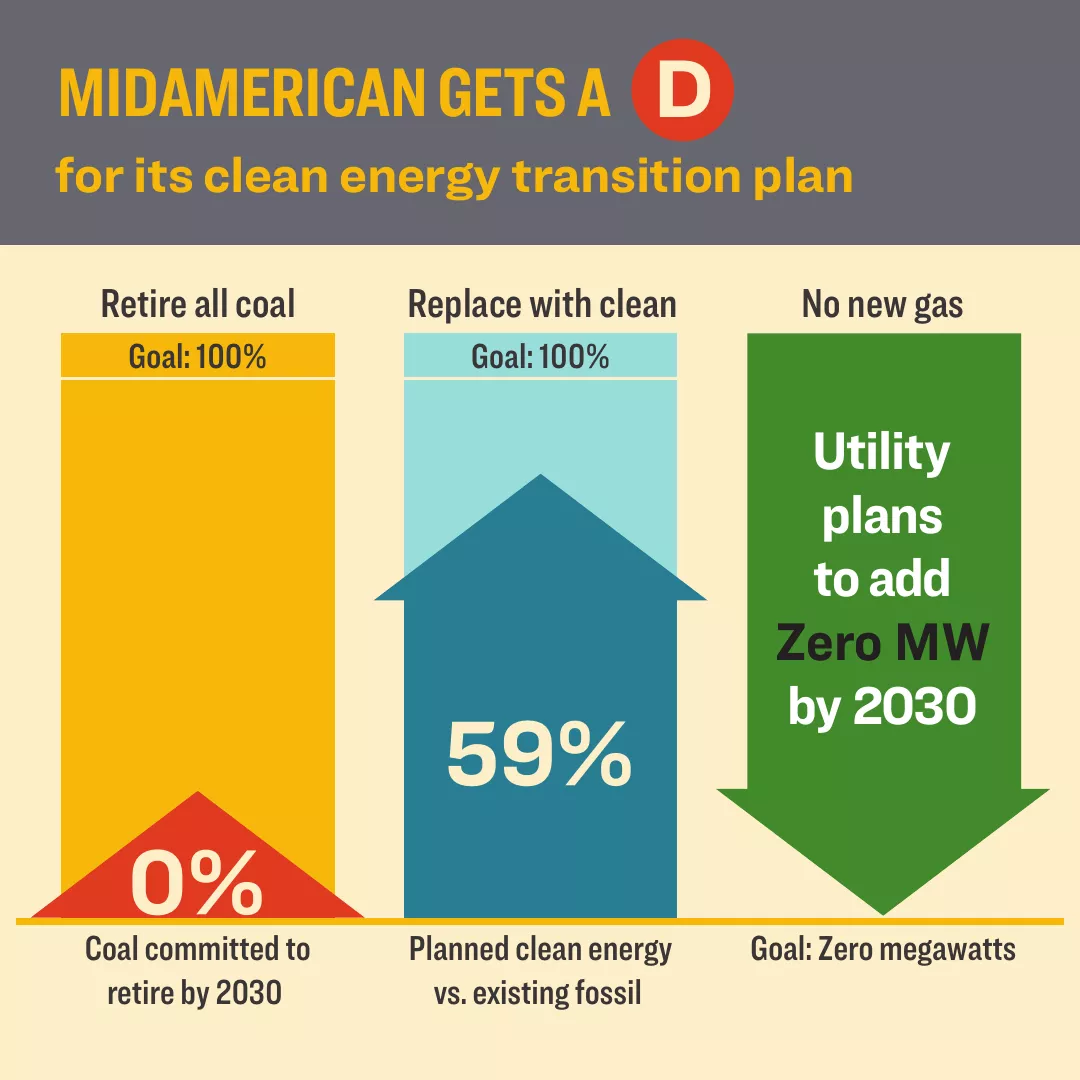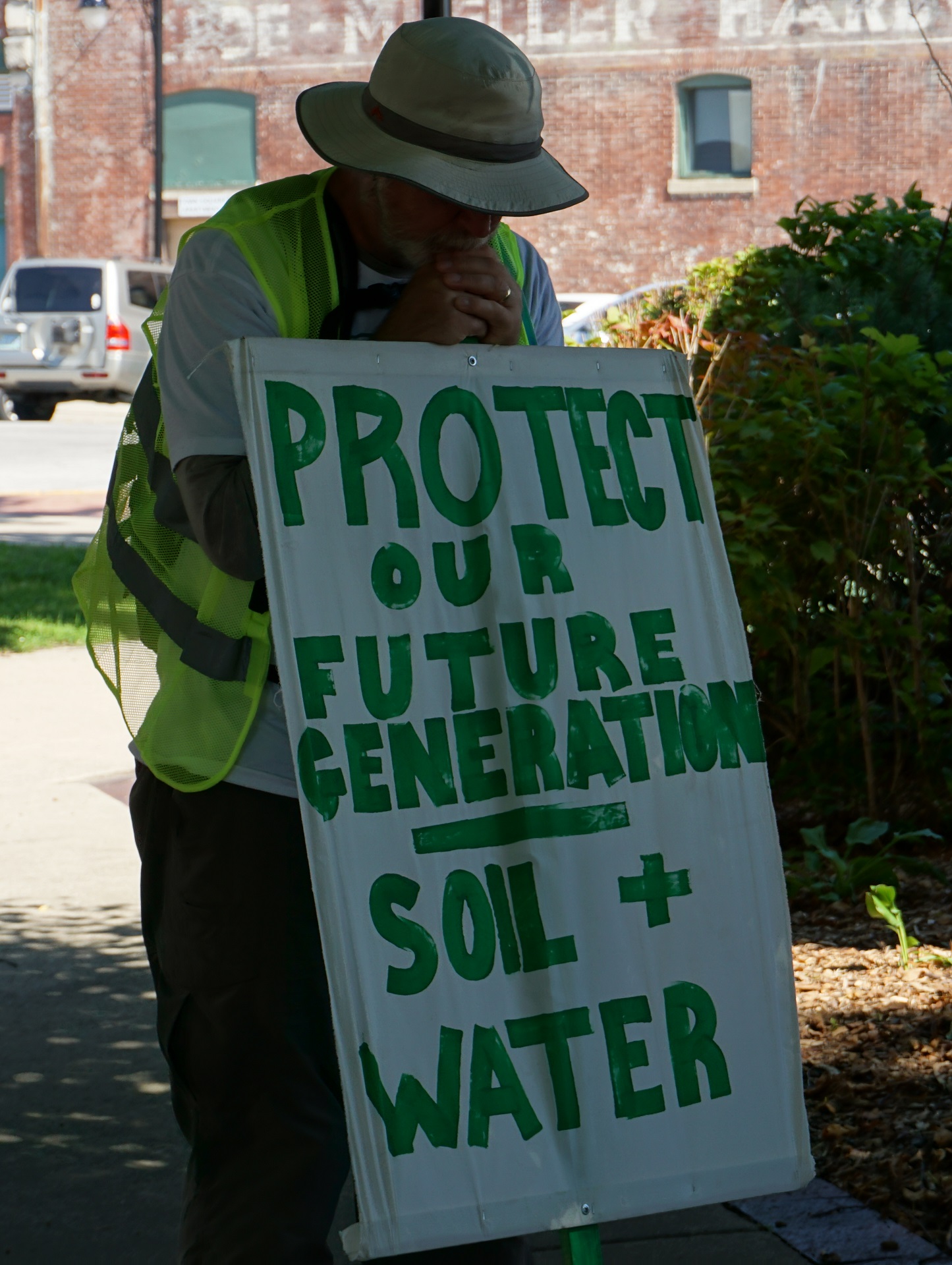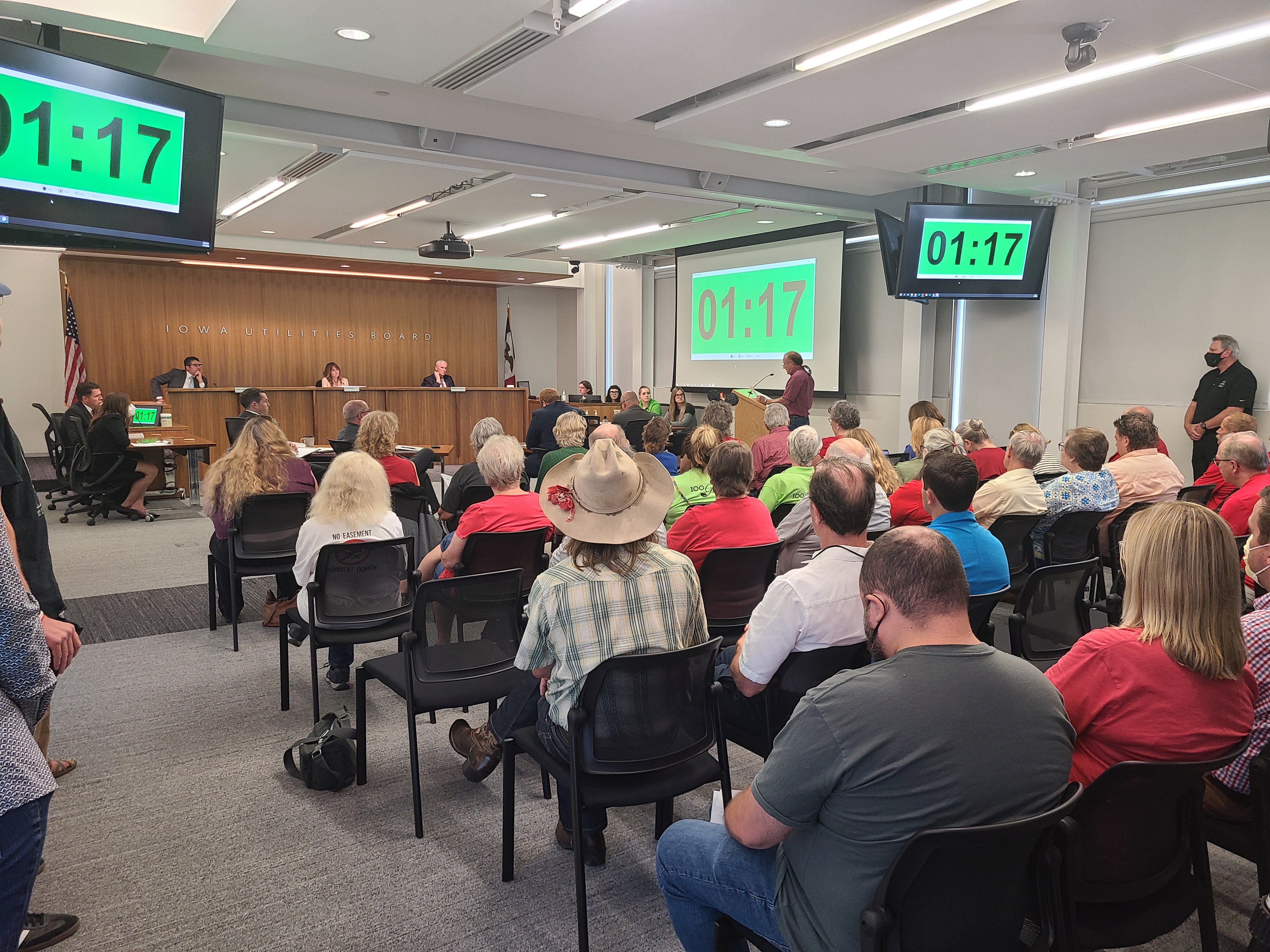As the season turns from summer to fall and then to winter, we are fortunate to watch the spectacular beauty of leaves turning their colors from green to yellow, orange, red, and brown. I hope you have found some time to get outdoors and enjoy nature's beauty.
Take care,
Pam Mackey Taylor, Chapter Director and Newsletter Editor
What you can do to help the environment
-
Plan to attend the Day of Action against the Carbon Pipelines, November 9, 9:30 to 3:30, 1800 Bell Ave, Des Moines, IA
-
Donate to the Iowa Chapter of the Sierra Club so that we can continue our work.
-
Catch up on this month's lunch and learn education videos
In this issue of the Iowa Sierran
Water Quality and Agriculture
-
Report from our annual meeting - "Celebrating 50 years of the Clean Water Act"
Carbon Dioxide Pipelines
-
Day of Action against the Carbon Pipelines - Join us for a Day of Action against the Carbon Pipelines, November 9, 9:30 to 3:30, 1800 Bell Ave, Des Moines, IA.
Transition to Renewable Energy
-
Actions by Congress Driving Renewables Boom
-
MidAmerican: Largest Carbon Polluter in Iowa Scores a ‘D’ on Coal-to-Clean Transition Sierra Club Report Finds
Plus
-
Join us for interesting and informative webinars and Lunch and Learns
-
Contribute to the Iowa Chapter
-
Volunteer for the Iowa Chapter
-
Calendar of events
-
To see the archive of previous Iowa Chapter newsletters
-
To see the White Pine Needle newsletter
Wolf Carbon Solutions re-doing landowner meetings
Prior to filing an application to build a carbon dioxide pipeline in Iowa, the pipeline company must notify landowners who are in the corridor and must invite them to an informational meeting.
It became very obvious during the landowner meetings that Wolf Carbon Solutions failed to notify several thousand landowners who were in the route of their proposed pipeline. So the Utilities Board began looking into the issue. Now Wolf has requested a do-over. These meetings will be held in December of this year, with a meeting in each county that will be crossed by the pipeline. The landowners and the public can attend the meetings and ask questions and make comments.
The informational meeting includes representatives of the Utilities Board, representatives of the Office of Consumer Advocate, and representatives of the pipeline company. After the informational meeting in each county, the pipeline company's land agents can begin negotiating the sale of the easement and also surveyors can go on the land to survey.
Wolf Carbon Solutions is partnering with Archer-Daniels-Midland Company (ADM) to run a carbon dioxide pipeline from Cedar Rapids, to Clinton, Iowa, and then to Decatur, Illinois. Along the way, the pipeline will cross 5 Iowa counties – Linn, Johnson, Cedar, Clinton, and Scott, although Johnson may be removed from the route.

Summit refuses to provide safety information
Summit Carbon Solutions has proposed to construct an 800-mile hazardous liquid pipeline across Iowa to carry carbon dioxide from ethanol plants to a location in North Dakota. Summit must obtain a permit from the Iowa Utilities Board (IUB) in order to construct and operate the pipeline. Summit filed a petition for that permit with the IUB on January 28, 2022. The petition contains information about the location of areas affected by the pipeline, a description of the project, financial assurance, other permits required, the purpose and need for the project, and a description of the properties for which eminent domain will be required.
For all IUB proceedings, the Office of Consumer Advocate (OCA) is automatically a party. The OCA is part of the Attorney General’s office. They advocate in Utilities Board cases on behalf of the public interest.
On April 19, 2022, the Office of Consumer Advocate (OCA) filed a motion requesting that the IUB require Summit to submit additional information in support of its petition for a permit. The OCA requested that Summit be required to file a statement of the risks and consequences of a pipeline rupture, an emergency response plan, a description of the procedure for selecting the route and evaluating alternative routes, a statement of the procedure used to conduct property surveys and easement negotiations, a statement regarding the use of public funds, and a description of Summit’s efforts to minimize the pipeline footprint.
The IUB ruled that Summit must provide a statement of the risks and consequences of a rupture, an emergency response plan, and the procedure for evaluating alternate routes.
Summit responded to the IUB order with a motion to reconsider. Summit claims that the IUB had no authority to require the information it had ordered to be produced. Summit claims that the federal government - the Pipeline and Hazardous Materials Safety Administration (PHMSA) - has jurisdiction of safety issues regarding pipelines. In other words, Summit is claiming that PHMSA has preemption over the Utilities Board and County ordinances related to safety concerns.
The IUB then issued an order scheduling a status conference where the parties would discuss how to address this issue. Sierra Club participated in the status conference. As a result of the lawyers’ discussion during the status conference, it was decided that the preemption issue would be considered and decided before any further procedures are scheduled.
The IUB has now scheduled a hearing on the issue of preemption for December 13, 2022. Sierra Club believes that decisions on the risks and consequences and the siting of carbon dioxide pipelines are not preempted by PHMSA. PHMSA’s jurisdiction is just over the construction, design, and operation of the pipeline itself. So even if other decisions might be based on safety, they are not within PHMSA’s jurisdiction.
PHMSA’s regulations of carbon dioxide pipelines need to be upgraded. PHMSA is planning to issue some new rules, which will hopefully be more protective of the public.
Day of Action against the Carbon Pipelines
Join us for a Day of Action against the Carbon Pipelines, November 9, 9:30 to 3:30, 1800 Bell Ave, Des Moines, IA.
The Carbon Pipeline industry is holding its national conference in Des Moines. We need to make sure they know that we want real solutions to climate change - not carbon pipelines! Please RSVP today!
Folks from all across the state and other impacted states are convening in Des Moines to say NO to this carbon pipeline boondoggle! The Day of Action includes a panel, workshops, lunch, and a rally!
Speakers are:
- Dr. Silvia Secchi, University of Iowa
- Dan Zegart, Climate Investigations Center
- Joye Braun, Indigenous Environmental Network
- Bill Caram, Pipeline Safety Trust
- Paul Blackburn, BOLD Alliance
Actions by Congress Driving Renewables Boom
by Katie Rock, Campaign Representative - Iowa Beyond Coal Campaign
On August 16, 2022, President Biden signed the Inflation Reduction Act (IRA) into law completing two years in Congress with the largest investments to date to address climate change. Together the Infrastructure Investment and Jobs Act (IIJA), Creating Helpful Incentives to Produce Semiconductors (CHIPS) and Science Act and IRA resulted in over $500 billion dedicated to accelerating the clean energy transition to meet the President’s goal of cutting greenhouse gas emissions 50% by 2030. You can learn more about the strategic investments made by these bills in our recent lunch and learn.
Though many details are yet to come on how exactly to tap into these opportunities, others are already clear. Our Iowa state energy offices are just now receiving guidance on the investment opportunities in the IIJA that was passed in November 2021. For the IRA, details will take some time. Rules are currently being written for how the Department of Treasury will use the tax credit provisions in the IRA and a public comment period will soon open this fall.
Yet some utilities have begun crunching the numbers on just how much further renewable energy will be thanks to the IRA. In Iowa, MidAmerican reviewed the economic impact to its proposed Wind PRIME project and found the IRA would yield an additional $1.3 billion in production tax credits. Unfortunately, MidAmerican has yet to change its plans to keep its coal plants running for decades in spite of the IRA. The savings apply to solar energy too. In Minnesota, Xcel found a planned solar project's costs will decline 27-32% thanks to the IRA.
The IRA includes a list of incentives on top of expanded tax credits for renewable energy to accelerate the coal to clean energy transition. A 10% bonus increase for tax credits are offered for projects in certain brownfield and coal mining communities, including at or adjacent to retired coal plants, and for projects meeting domestic content requirements. Extra bonus incentives are available for hiring from local apprenticeship programs and paying a prevailing wage. The IRA also allows developers to convert tax credits into cash payments by selling the credits, opening the door for direct ownership and potentially creating extra income from unused credits. Plus, to cover additional costs the IRA approved a new loan program through the Department of Energy called the Energy Infrastructure Reinvestment program. This program will provide qualified projects with low-cost loans to support the transition to cleaner energy, including the ability to refinance higher-cost debt and equity, saving ratepayers billions of dollars.
We are now poised to see a massive buildout of renewable energy across the midwest this decade. No where is that more evident than in the applications to join our regional electric grid, the Midcontinent Integrated System Operator (MISO). Last month was the deadline for developers to apply to build new energy projects in the 14-state MISO territory. The result, for the third year in a row, was a record for renewables including over 8 GW of potential wind, solar and battery projects for Iowa. Many of these projects may not be built, but it speaks volumes to how much interest exists post-IRA.
MidAmerican: Largest Carbon Polluter in Iowa Scores a ‘D’ on Coal-to-Clean Transition Sierra Club Report Finds
Des Moines, IA – The Sierra Club released today the second edition of its ground-breaking report, The Dirty Truth About Utility Climate Pledges, that exposes how most major electric utilities greenwash their climate action commitments. The report grades utilities across the country based on their plans to retire coal plants, cease building new gas plants, and invest in clean energy. The report demonstrates if, and to what extent, each utility’s plans make the necessary changes to confront the ongoing climate crisis by curbing CO2 emissions.
The largest carbon polluter in Iowa, MidAmerican Energy, scored a ‘D’ grade, despite significant investments in wind energy, because the utility has no plans to retire its five Iowa coal plants before 2049. Berkshire Hathaway, MidAmerican’s parent company, likewise earned a ‘D.’ MidAmerican, a monopoly public utility in Iowa, has not released any plans to meet its aspirational goal of eliminating carbon pollution by 2050.
Katie Rock, Campaign Representative for Sierra Club’s Beyond Coal Campaign in Iowa, released the following statement:
“From crop-destroying droughts to life-threatening derechos, Iowans are front-and-center in facing the climate crisis. MidAmerican must address its contribution to the climate crisis and commit to retiring its coal plants. Iowans deserve better.”
Background
The Dirty Truth, Version 2, scores the largest 50 utility parent companies and 77 utility operating companies based on their plans for coal retirements, new gas generation, and clean energy commitments. The report highlights the massive discrepancies between the climate pledges utilities make publicly and their actual plans to meet those pledges. Dirty Truth exposes the “greenwashing” tactics many companies use to make false, misleading, or untrue claims about utility impacts on the environment. The report also highlights the unprecedented potential of the newly-passed Inflation Reduction Act, which includes nearly $370 billion in clean energy incentives that utilities should tap into in accelerating their response to the climate crisis.
Accompanying the report is an updated interactive website which allows the public to look up their utility’s grade, its coal plant retirement schedule (if one exists), its planned gas plant capacity, and its investments in clean energy. The website also includes a national map to help users look up their utility service area and a digital dashboard for researchers, energy analysts, and media partners to keep track of each utility’s progress over the next decade.
Read the report "The Dirty Truth About Utility Pledges"

Join us for interesting and informative webinars
Lunch and Learns
Every Friday at noon, we do a Lunch and Learn livestream. See us on Facebook at "Sierra Club Iowa Chapter". These will be recorded so you can watch them anytime. Topics will be selected based on what is happening during the week and will be announced the day before the livestream. During the legislative session, we cover issues coming before the Iowa legislature.
In case you missed our past webinars and lunch and learn sessions, you can still see them.
- Watch "Trees", October 14, 2022
- See "Pipeline Update! What Counties can do right now!", October 7, 2022
- Learn about "Reliability in 2022", and the transmission grid, September 30, 2022
- Watch "Driving Electric", September 23, 2022
- Learn about "The Utilities Board status conference on Summit", September 16, 2022
Report from our annual meeting - "Celebrating 50 years of the Clean Water Act"
Jerry Anderson, dean of the Drake Law School, presented the keynote address at the Sierra Club's annual meeting that celebrated 50 years of the Clean Water Act. Jerry reminded us that in the 1970's, the United States House and Senate passed a number of ground-breaking pieces of environmental legislation, including the Clean Water Act. Prior to the Act's passage, raw sewage and factory waste were routinely dumped into the country's rivers and streams. The Clean Water Act was able to reduce the sewage and factory waste dumping. However, we have reached a point where run-off from agricultural lands needs to be brought under control. Jerry compared it to driving a Model T car to solve today's problems.
The problems with our water quality seem to be mounting - large numbers of impaired waters that are never removed from the impaired waters list, no numeric water quality standards for nitrogen and phosphorus, non-point agriculture sources are not being reduced, the nutrient reduction strategy is not working to reduce nutrients, and emerging pollutants need to be dealt with. Plus currently there is no political will to deal with the problems.
The keynote was followed by a spirited panel discussion, moderated by Wally Taylor.
Chris Jones, research engineer at the University of Iowa, reminded us that the nutrient reduction strategy is working just fine for those who do not want to change their farming practices.
Silvia Secchi, professor in the Department of Geographical and Sustainability Sciences at the University of Iowa, emphasized that in order to get improvements in water quality, the whole system and processes used in agriculture need to change.
Steve Veysey, retired chemist for Iowa State University, explained that clean water belongs to all of us. Those who pollute the water and degrade water quality are stealing from all of us.
Matt Liebman, professor emeritus of agriculture at Iowa State University and the Henry A. Wallace Endowed Chair for Sustainable Agriculture, reminded us that using some fertilizer is good, but too much fertilizer is too much. The too much runs off the fields and becomes pollution.

You can view the key note speech by Jerry Anderson on YouTube
View the panel discussion on YouTube
Volunteer for the Iowa Chapter
Almost everything we do is done by volunteers like you. If you would like to volunteer for the Iowa Chapter, please let us know by sending an E-mail to Iowa.chapter@sierraclub.org. Or sign up by using the online form. There are many opportunities for you to make a difference:
-
making phone calls
-
developing graphics for banners and flyers
-
working on legislative issues
-
working on elections
-
fundraising
-
organizing events
-
joining an issue committee
If you would like to join our legislative action team, sign up here. Keep on top of what is happening at the Iowa legislature. Be alerted when you should contact your legislators about pending legislation.
Contribute to the Iowa Chapter
Sierra Club - the best bet for achieving bold solutions to Iowa’s environmental problems
Sierra Club is Iowa’s oldest and largest grassroots environmental organization. Not only that, we are the best bet in the state for achieving bold solutions to Iowa’s environmental problems.
We work in the courts, before Iowa’s public agencies, and in the halls of the legislature. The Iowa Chapter's effort to protect the environment takes financial support. The Chapter receives very little financial support from the national Sierra Club. Can we count on you for a donation to ensure even more victories? Your contribution will be put to work here in Iowa on issues that affect every day Iowans – water quality, clean air, protection of Iowa's soil, parks and natural areas, and a strong democracy. The Iowa Chapter is relentless in fighting back bad legislation that affects every one of us.
Your non-deductible contributions make it possible for us to fight bad legislation and to promote good legislation. We appreciate your past and on-going support of these efforts. You can make a non-deductible donation with a credit card. A non-deductible donation supports the Chapter's effective, citizen-based advocacy and lobbying programs. If you prefer, a non-deductible check can be written to the Sierra Club Iowa Chapter and mailed to:
Treasurer
Sierra Club, Iowa Chapter
PO Box 1058
Marion, IA 52302
You can also make a tax-deductible donation with a credit card. Tax-deductible activities are limited to public interest education, research and legal actions. A deductible check can be written to the Sierra Club Foundation with “Iowa Chapter” written in the memo line.
Thank you for your support.
Donate your used vehicle
As the Sierra Club Foundation's Iowa Chapter continues to raise charitable funds to support its work in Iowa, won’t you consider participating in our vehicle donation program? Our partners over at CARS have made the process of donating your unused or unneeded car, truck, motorcycle, boat or RV easy, efficient and secure. They’ll take care of everything from picking up your vehicle to sending you a tax receipt for your generous gift. To learn more about The Sierra Club Foundation's Iowa Chapter vehicle donation program, please call 844-674-3772. Or visit our webpage to get started today!
Sierra Club Foundation promotes climate solutions, conservation, and movement building through a powerful combination of strategic philanthropy and grassroots advocacy. The Foundation is the fiscal sponsor of Sierra Club’s charitable environmental programs.
For more information
Planned giving . . . naming the Sierra Club Iowa Chapter in your will
Ensure your environmental legacy by naming the Iowa Chapter in your will or trust. These gifts cost you nothing now. You can hold onto your assets for as long as you need them.

Thank you for supporting our work!
| When | Earliest: Latest: |
| What |
|
| Word or Phrase | Word or phrase to search for: |
| Leader | All or part of leader name to search for: |
No Matching Activities Found
Loading
| Date | Activity (click title for full description) | Sponsor | Category | Type | Difficulty | Links |
|---|
Loading ...
 Outing
Outing Club support event
Club support event  Social event
Social event  Activist event
Activist event  Multiple events (map only)
Multiple events (map only)